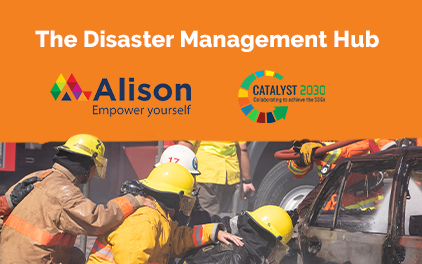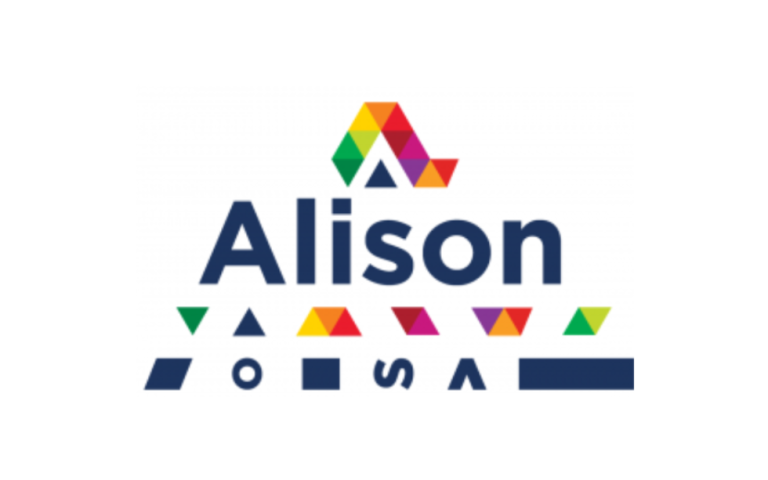Alison is proud to announce the launch of the Disaster Management Hub in association with Catalyst 2030. The hub brings together crucial and potentially life-saving information both on how individuals can survive disasters and how organisations can better respond to and resource disaster situations.
Catalyst 2030 is an organisation of social entrepreneurs united in their commitment to achieve the UN’s Sustainable Development Goals. Catalyst 2030 is composed of various dedicated groups specialising in particular areas. The Disaster Management Group, chaired by Alan Braithwaite, has worked closely with Alison in creating this unique and free resource that aims to radically alter how we respond to disasters.
The Alison Blog spoke to Alan about the fundamental roles that both social enterprise and education have to play in reshaping disaster relief.
Hi Alan, can you tell us a bit about the aims of Catalyst 2030 and your role in the organisation?
Catalyst 2030 is a movement of social entrepreneurs across the world who are coming together to try and have a significant impact on the achievement of the UN’s 17 Sustainable Development Goals. The proposition is that, compared to top-down government actions, social entrepreneurs on the ground can make a disproportionate difference in promoting and implementing change.
Catalyst 2030 came together just two years ago and already we’ve attracted over a thousand members. We’re sponsored and funded by some of the most significant charitable foundations in the world – Ashoka, the Schwab Foundation, the Scholl Foundation, Echoing Green and the Bill and Melinda Gates Foundation as well.
Catalyst 2030 is built around both geographical groups and groups who come together around various conceptual or operational issues. I’m chairing the group on Disaster Management, organised around what we’ve called the three R’s of disaster: readiness, response and recovery.
We’re trying to craft and define a role for social entrepreneurs in the global system of how the world deals with disasters. There’s no question from the research that we’ve done that the way in which the world copes with disasters is broken. It’s characterised by not being as prepared for the obvious scenarios as one could be, arriving late, bringing the wrong things, leaving before people have had a chance to recover and all of the associated and well-documented questions of white colonial judgements as to what is good for people on the ground.
How did this collaboration between Catalyst 2030 and Alison come about?
Mike Feerick, Alison’s CEO, is a member of Catalyst and we identified very early on that there was a lack of both knowledge and access to knowledge for social entrepreneurs, agencies and authorities in terms of what needed to be done in disaster and potential disaster situations. So Mike stuck his hand up and said Alison is one of the largest online providers of educational resources and knowledge. Also, while Alison is a for-profit social enterprise, they don’t charge the ultimate user so it’s free at the point of use. And so Mike offered this amazing organisation’s capability up to the group. So Alison has created, discovered and consolidated a relevant body of knowledge into a Disaster Management Hub that is easy to access.
Why is education so vital for disaster management?
If you’re in a disaster, it’s likely that you’ll never have encountered one before so having the ability to access basic information on what’s happening, and what would be good or not good to do, is really important. That’s the first thing.
The second thing is that we’re trying to create an organisational framework so that social entrepreneurs can be a credible resource in the disaster relief chain. We need resources and information to be made available so that social entrepreneurs, who haven’t necessarily dealt with disasters before, can pivot to help and leverage their resources. They need access to knowledge and understanding in the easiest possible way and so that’s the value in the Disaster Management Hub.
How do you hope to see the Disaster Management Hub on Alison work?
The Disaster Management Hub carves out a specific space for information that we can then promote easily. It will also help us to invite contributions and attract partners to the project. We’ve found that was there’s actually a lot of courses already on Alison that are extremely relevant. The hub allows us to centralise those resources and then expand them.
What role do you think social enterprises can play on the ground in disaster situations?
Social enterprises are generally speaking local. They’re on the ground, they’re trusted and they exist with the consent of their community. If and when disaster strikes, they’re already there. They very often have relationships with local government and therefore they’re in a position to pivot and offer support with logistics, resources and organisation much more quickly than external organisations.
We know from all of the anecdotes that when disaster strikes it often takes three or four days for the big agencies to start to appear because they often spend time competing with each other for resources, rather than worrying about the people that are affected.
If the people on the ground can be better organised through the capabilities of social entrepreneurs, then the international resources can be better informed and the relief will be more relevant, targeted and effective.
What are the next necessary steps in setting up Catalyst 2030’S Disaster Management Group?
We’ve got a clear strategic plan now and we’re in the process of creating a full-blown programme. Having formalised the training and education, we now have to devise an operating protocol so everybody knows what their role is in the future system.
Alongside education we’ve obviously also got to build partnerships. We need to create an understanding as to what the information and communications technology infrastructure will be to support information flow in a disaster situation and how that can be managed.
We also need to explore how we make funding available. For example, if an area is particularly prone to disasters then maybe there are things they can invest in that will both mitigate that and also produce a return. There’s a lot of experience now in impact investments and that’s something we’ve got to integrate into our operating system.








